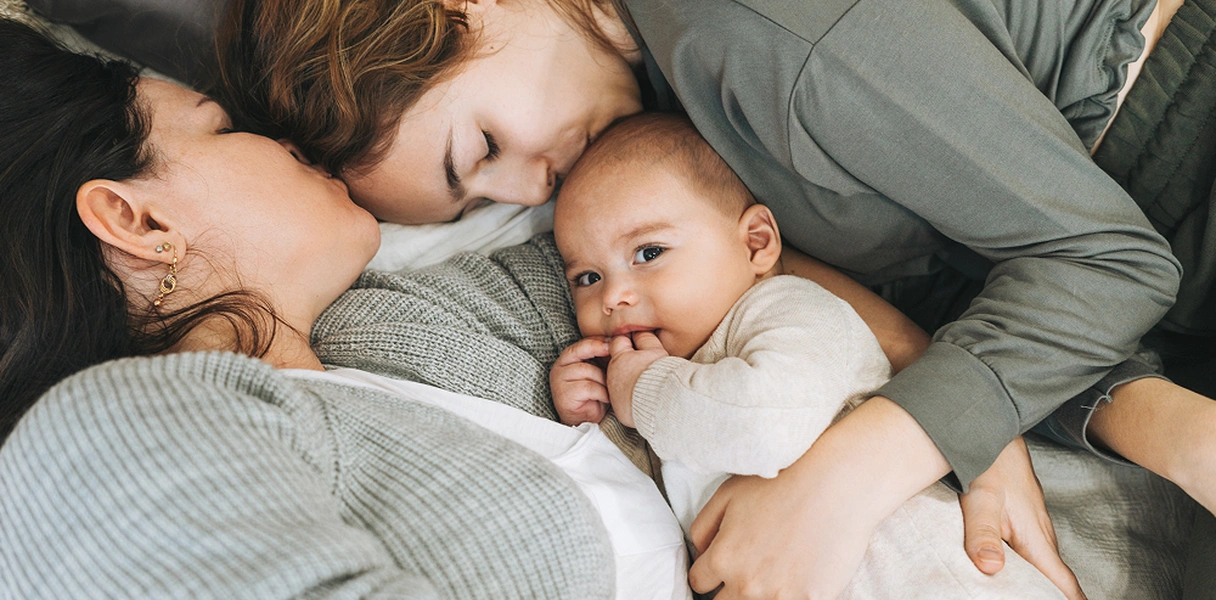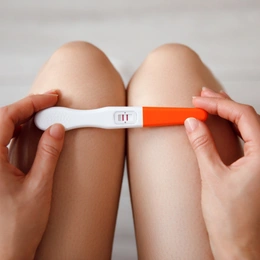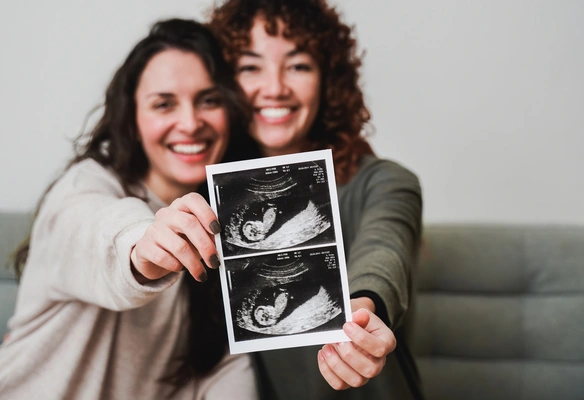The eggs are fertilised with sperm from a donor, previously selected according to physical characteristics and blood group. The sperm is thoroughly analysed to rule out genetic or infectious diseases.
ROPA method
Shared motherhood for female couples

The ROPA method (Reception of Oocytes from the Partner) allows female couples to share the experience of being the biological mothers of their child. One provides the eggs and the other carries the pregnancy, creating a unique bond from the very beginning of the process.
At Fertility Madrid, we support each couple in a personalised way to help them achieve their wish of starting a family.
- What is the ROPA Method and what does it involve?
- What is the step-by-step process?
- Who can undergo the ROPA Method?
- Is the ROPA Method better than other treatments?
- How is the sperm donor chosen?
- Price of the ROPA Method and financing options
- Why choose Fertility Madrid?
- Frequently asked questions about the ROPA Method
What is the step-by-step process?
Ovarian stimulation of the donor mother
The woman providing the eggs undergoes controlled hormonal stimulation to obtain several mature oocytes. Ultrasound monitoring is carried out until the optimal size is reached.
Follicular puncture and egg retrieval
When the follicles are ready, ovarian puncture is performed in the operating theatre under sedation. The retrieved eggs are then taken to the laboratory.
Fertilisation with anonymous donor sperm
Embryo culture and selection
The embryos are cultured in the laboratory for several days. Our team selects the embryo with the greatest implantation potential for transfer.
Embryo transfer to the gestational mother
The woman who will carry the pregnancy undergoes hormonal preparation to receive the embryo. The transfer is carried out in the clinic and does not require anaesthesia.

Pregnancy test
Ten days after the transfer, a blood test (beta hCG) is performed to confirm the pregnancy.
Who can undergo the ROPA method?
This treatment is recommended for:
- Female couples who wish to share motherhood
- Women who have not succeeded with donor artificial insemination
- Cases where one woman has a good ovarian reserve and the other a receptive uterus
Is the ROPA Method better than other treatments?
Compared with artificial insemination or conventional IVF with a donor, the ROPA Method offers a unique emotional advantage: both women share the process.In medical terms, the success rate will depend mainly on the age and ovarian quality of the donating mother.

How is the sperm donor chosen?
In Spain, sperm donors are legally anonymous. At Fertility Madrid, we select the donor according to:
- Physical characteristics similar to those of the couple
- Compatible blood group
- Complete genetic screening
- Infectious disease screening
- Psychological assessment
Price of the ROPA Method and financing options

Why choose Fertility Madrid?
- Clinic specialised in shared motherhood in the centre of Madrid
- Laboratory with state-of-the-art technology
- Medical team with extensive experience in treatments for female couples
- Personalised care at every stage of the process
- First informative visit free of charge and without obligation
Frequently asked questions about the ROPA Method
In which cases is the ROPA Method recommended?
Reception of Oocytes from the Partner is indicated in cases of women who have another woman as their partner and:
-
Both women want to take part in the pregnancy.
-
They do not wish to undergo, or have not succeeded with, Donor Artificial Insemination.
How is it decided who will be the gestational mother and who will be the donating mother?
The decision on how to carry out the process must be an intimate reflection of the couple, but good medical advice is important to improve the conditions of the treatment.
It is important to individualise the cases and see which options best suit the couple’s situation.
What requirements must the donating mother meet?
She must have a good ovarian reserve and be suitable for hormonal stimulation.
And the gestational mother?
She must have a healthy uterus and respond adequately to hormonal treatment.
How is the donor chosen?
The sperm donor is anonymous and is chosen according to his physical characteristics and blood group. Each sperm donor undergoes a rigorous medical examination to prevent the transmission of genetic and infectious diseases, as well as a psychological test.
Can embryos be preserved?
Yes. Unused embryos can be vitrified for future transfers.
Is the ROPA Method legal in Spain?
Yes. It is a legal technique and increasingly sought after by women who wish to become mothers together.
Is it necessary to be married to access the ROPA Method in Spain?
Yes. Spanish law requires that both women be legally married in order to register the baby as the child of both from birth. Without marriage, only the gestational mother would appear in the civil registry, and the other would have to begin an adoption process.
How long does the whole ROPA Method process take?The treatment usually lasts between 4 and 6 weeks from the start of ovarian stimulation to the embryo transfer, although this may vary depending on each woman’s cycle and the availability of the laboratory.
The treatment usually lasts between 4 and 6 weeks from the start of ovarian stimulation to the embryo transfer, although this may vary depending on each woman’s cycle and the availability of the laboratory.
What is the success rate of the ROPA Method?
The success rates are comparable to those of in vitro fertilisation with a woman’s own eggs, since the eggs of one woman and the uterus of the other are used. Factors such as the age of the egg donor and the quality of the sperm are decisive.
What happens if neither of the two has a good ovarian reserve?
In these cases, donor eggs can be used, while keeping the option for one of the women to carry the pregnancy. The medical team will advise on the alternative with the greatest chances of success.
Is it possible to undergo the ROPA Method if we do not live in Madrid?
Yes. Many couples come from other cities or countries. The clinic can coordinate the preliminary phases and reduce the number of in-person visits, always ensuring the safety and effectiveness of the treatment.
What happens to the embryos that are not used in the first transfer?
The remaining viable embryos are vitrified (frozen) for future transfers, either to try for a second child or in case the first transfer does not result in pregnancy.
Can we switch roles in future pregnancies?
Yes. As long as medical conditions allow, the roles can be reversed: the one who provided the eggs can carry the pregnancy, and vice versa. This enables both to experience pregnancy.
¿Requiere el Método ROPA la misma medicación que una FIV convencional?
The woman who provides the eggs will receive medication to stimulate ovulation, and the one who carries the pregnancy will take hormonal treatment to prepare the endometrium. The protocol is personalised according to each case.